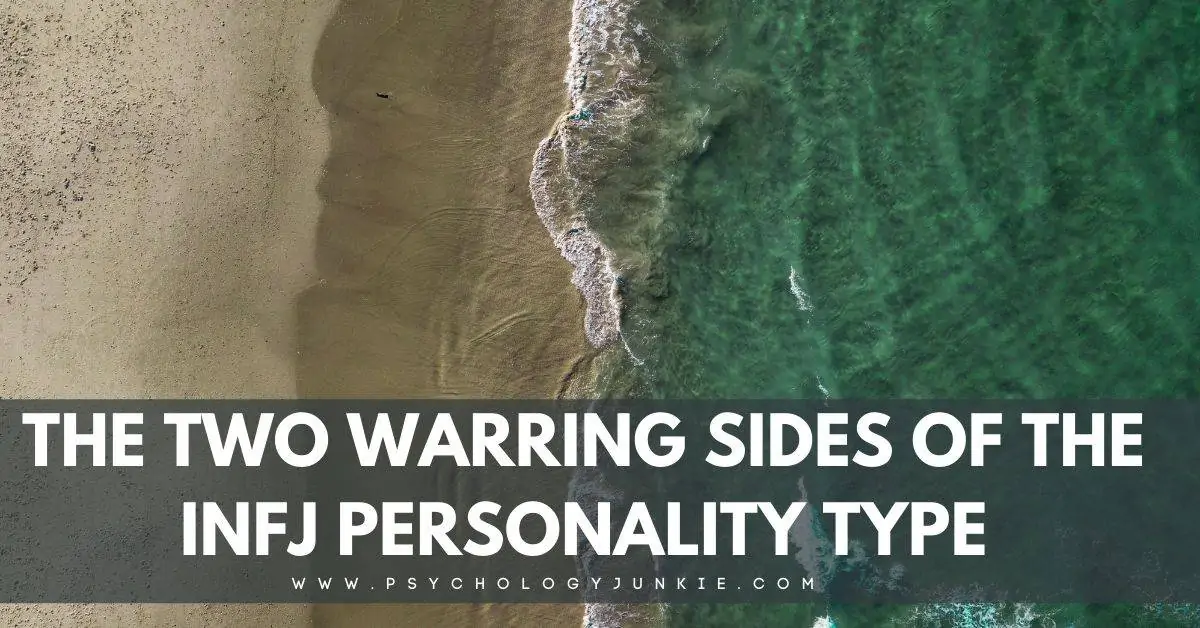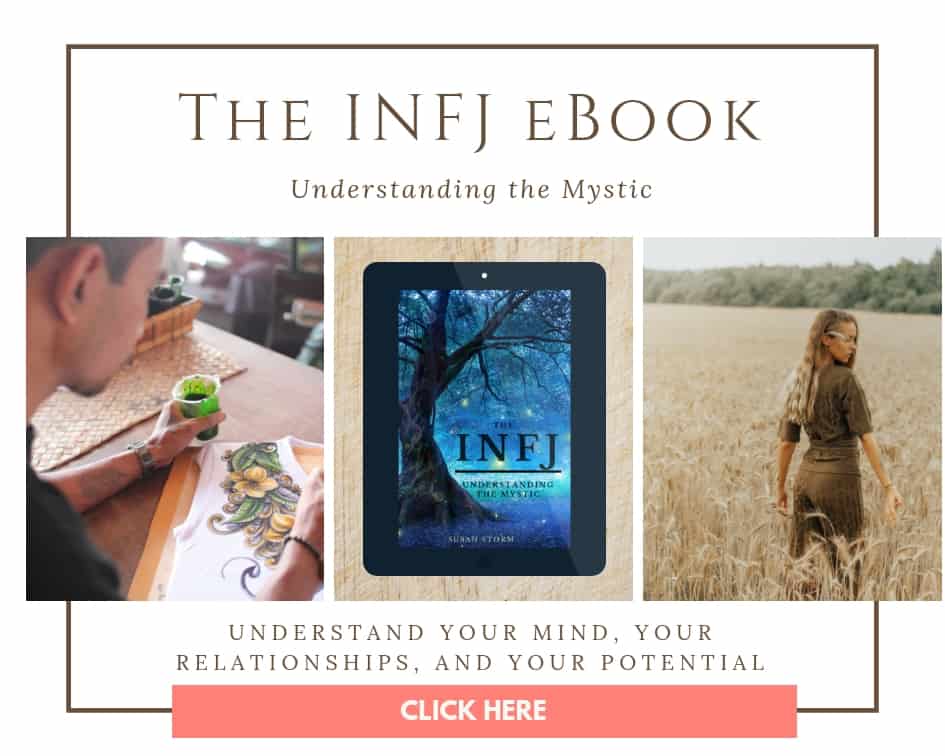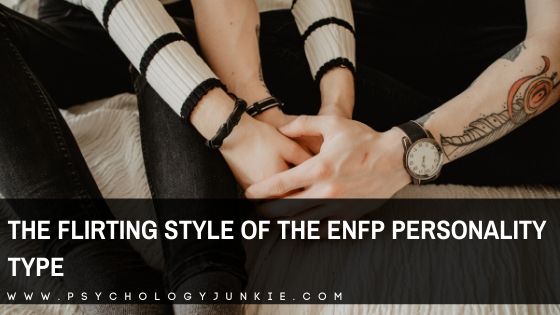The Two Warring Sides of the INFJ Personality Type
Do you ever feel like two sides of you are constantly in conflict with each other?
One side of you craves the tranquil peace of aloneness, while another side of you craves the warmth and intimacy of social connection.

One side of you desperately needs the openness of unstructured quiet time, while another side of you demands that you meet a plethora of external responsibilities.
One side of you craves social harmony and ease, while another side of you wants the world to stop interrupting you so you can focus on ideas and possibilities that dwell within your mind.
The Intuitive & Feeling Dynamic
INFJs are usually gentle and deeply in tune with the emotional dynamics and needs of others. They use their intuition to understand complex situations, meanings, and relationships, and their feeling function helps them to empathize with others and to tune into the emotional undercurrents playing beneath the surface.
INFJs feel it their supreme duty to render service to humanity. Often their visions, far-reaching and beautifully complex, paint a picture of a better world for people. Whether they’re planning for their family or organizing a non-profit, their visions and dreams involve people working towards unity, harmony, and a sense of connection and shared purpose.
However, INFJs can be perfectionistic and idealistic to a fault. They may set themselves impossibly high standards, and they can be intolerant of anything inside themselves that doesn’t meet their expectations. INFJs are also highly sensitive to criticism, even if it’s constructive, often fearing that they’ve let other people down or let themselves down.
– Otto Kroeger and Janet M. Thuesen, Type Talks
The Open-Ended, Flexible Nature of Intuition
The more INFJs get in touch with their intuition, the more the world seems vast, flexible, and full of possibilities and insights. Their insights and ideas are complicated, and as they spend time alone they sink into layer upon layer of meaning and richness. One idea is analyzed, then, as if mentally wandering to a lower level, the INFJ finds another layer of meaning and then another.
INFJs can become so lost in their intuition that they withdraw from the world, seemingly in a trance-like state. They may not be able to verbalize what it is they’re seeing, but they know it’s important and worth paying attention to.
When INFJs are alone, there’s a sense of aliveness that can make them giddy with excitement and energy. The external world falls away and all that’s left are pictures, possibilities, visions, and mazes of meaning and profound emotions.
Left to their own devices, INFJs can fill notebooks with ideas, theories, philosophies, and emotional expressions. Music gives their insights a color and texture that only amplifies the whole experience. Complete solitude and sensory deprivation can give the imagination a more profound, epiphany-type quality.
When Responsibility Calls
But INFJs, like most Judgers, have high demands of themselves when it comes to their external world. They insist upon meeting their obligations and aim to take care of the people who matter most to them. They are strong believers in dependability, loyalty, and generosity. Often they feel responsible for making the world a better place, and for taking care of their family.
Many an INFJ will only wander into the musings of their intuition for a moment, before feeling the weight of responsibility on their shoulders. They believe in pulling themselves together for everyone else’s sake, while at the same time vowing to support everyone who matters to them with deeper insights into life.
So they shut the door on their musings and insights and wash the dishes or call their friend back or stay at work late. It’s not that INFJs don’t want to make time for their inner world, it’s just that they often think they’re strong enough to handle whatever the day brings. They may feel like they can either endure or rise above whatever comes their way. A childhood of having their insights dismissed or met with skepticism only aids in this process.
The Importance of Balance
INFJs who are able to set healthy boundaries for themselves, and manage the expectations of others, will find that their intuition is enriched. They need to know that it’s okay to sink and swim in the endless world of their imagination and intuition. It’s okay to take a break; to say “no” to external demands and bask in the solitude.
If you’re reading this, you probably recognize the battle between meeting external expectations and taking care of your introverted needs. You probably recognize the well of emotions and ideas inside you that are going unprocessed.
Or maybe you’re an INFJ who has withdrawn from the world – only you’ve withdrawn too far. You’ve lost touch with people, with your goals, and with the natural world. You feel unfocused or only half-conscious.
In my experiences coaching INFJs, I’ve noticed that they fall on two ends of this spectrum quite frequently. More often than not, I find INFJs who desperately want time alone to process, analyze, and intuit. Yet these INFJs feel hyper-responsible for others and have an incessant itch to take care of people. They are preoccupied with peoples’ feelings and emotions, reading the room for any need that is going unmet. At the extreme end, this can look like codependency. At a more average or healthy level, it can just look like empathy with action.
Other INFJs I’ve worked with have gone in the opposite direction. They’ve retreated so far from the external world that their visions and ideas stay just that: visions and ideas. They feel isolated from the world, confused about their purpose, and lonely.
How can you find a healthy balance between these two sides of yourself?
It’s crucial to realize that both the introverted intuitive side of yourself and the more extroverted, feeling side of yourself are both parts of you. They both need air and space to breathe. Just like you can’t only live using one part of your body, you can’t suffocate one part of your consciousness without the other part suffering simultaneously.
Look at your schedule. Are you getting enough time to yourself and enough time with people you trust? Are you making time to do the things that nourish your soul?
Take care of yourself in whatever way makes sense for you. If it’s a long walk, a yoga class, or an hour watching a candle melt while listening to your favorite song on repeat – do it! Trust me: You need the practice of saying “yes” to the things that revive you.
Remind yourself of this: When you take care of yourself you are better able to take care of others. When you respect yourself, you are more likely to get respect from others. When you prioritize self-care, you set an example for your children, family, friends, and others that it’s okay to prioritize yourself.
How to Reach a “Ni” Flow State:
Ever wondered why sometimes ideas just seem to spring forth in a way that seems almost effortless? You can recognize these moments because you have 100% mental clarity. You don’t feel tired or frustrated when articulating your thoughts and they’re coming from a place of pure insight. If you’d like to experience a “flow” state more often, try some of these practices:
- Spend some time each day in a quiet place. Allow ideas to come into your consciousness without pressure. Don’t try to control your mind. As ideas flow through you, write them down (or draw them).
- Imagine yourself without limits or boundaries. What would you do? What would you be?
- Project yourself into the future. Let images and visuals come to you. Sink into what you see and imagine. Close your eyes. Afterwards, write down your thoughts and feelings.
- Go for a drive without a destination. Let your mind wander.
- Go to sleep thinking about an interesting question. In the morning, before you get out of bed, try to recall anything that came to you last night.
- Read a poem or a quote you love and then simply allow yourself to muse on it for a while. Play instrumental music if it will help furnish a mood or aesthetic.
Honoring Your Extroverted Side:
It’s not enough to nourish your introverted side (although for many INFJs, that side is sorely neglected). It’s also imperative to take care of the extroverted side of yourself. Just as you need both your heart and your lungs, you need your introverted intuition and your extroverted feeling side.
How can you honor this side of yourself?
- Watch psychological dramas or movie/TV shows that are all about human relationships, emotions, and thought processes. Think about what makes the people “tick” and analyze the relationships in the show.
- Absorb good vibes. Spend time around friends doing something you all love. Let yourself absorb their positive emotions and fully immerse yourself in their joy, laughter, and good feelings.
- Plan an experience that will make the people you love happy. Imagine the details and their specific responses as you prepare this experience.
- Practice random acts of kindness. Pay for the coffee of the person behind you in line at Starbucks, take cookies to your neighbors, or simply smile at people you pass on your morning walk.
- Stand up for your values compassionately. Speak up in defense of a value you care about that will positively impact others. Make graphics to showcase your cause. You could also persuade people through conversation, but do so using your gift for harmony and diplomacy. Use warmth and empathy to talk to people who disagree with you rather than becoming combative or defensive.
Learn the Importance of Healthy Boundaries:
As an INFJ it’s all too easy to get wrapped up in everyone else’s feelings. The emotional wavelengths around you can seem all-encompassing and overwhelming. You probably feel an urgency to “fix” the feelings of everyone and make sure nobody ever experiences a pang of sadness. You may feel that if you don’t go out of your way to take care of people, they will suffer.
But this way of living is unsustainable and healthy.
Of course it’s valuable and good to have empathy. But you must also have empathy and understanding for yourself.
This is where boundary setting comes into play.
If a person is being overly emotional around you and draining you of your energy, let them know that you need a little time to think and stop the conversation for awhile. If it’s necessary to continue talking to this person, do so with boundaries (i.e., don’t allow yourself to become enmeshed – distance yourself from their emotions so that you’re not wallowing in them).
Another example:
INFJs will do almost anything for the people they love. They hate to see anyone theyt love struggling. But before you take on another “need” or soothe another hurt from someone else, ask yourself if it’s best for them. Are you taking responsibility for things that aren’t yours to be responsible for?
Other people’s feelings are their own responsibility. You can only control your responses and reactions. You can’t control theirs.
Below is an excellent quote that I remind myself of when I’m overwhelmed by other people’s emotions:
Melody Beattie, Codependent No More: How to Stop Controlling Others and Start Caring for Yourself
How Can You Thrive Even More as an INFJ?
There are dozens of articles about thriving and understanding yourself as an INFJ on this website. However, if you’re looking for something more intensive, you can also read my in-depth eBook about the INFJ personality type:
Want free helpful INFJ information? You can read these articles now:
10 Things INFJs Look for in a Relationship
Your INFJ Personality Type and Your Enneagram Type
Subscribe to Our Newsletter

Want to discover more about personality type? Get the inside scoop with Susan Storm on all things typological, along with special subscriber freebies, and discounts on new eBooks and courses! Join our newsletter today!












Nice one
Thanks so much for this kind of information,I found it very helpful.
I’m so glad you enjoyed it! Thanks for the input!!
Nail on the head dead on. I’m at a cross roads myself. Husband left me out of the blue for a younger female and now I went from having to do everything to having so much time on my hands. I hate it and love it at the same time I just don’t know what else to do if I’m not being a wife. I try to find ways to feel fulfilled at the end of the day but no luck. 8 years is a long time to have your feet ripped out from under you with no hint of what was to come. Thank you for the read. It really is helping me sort things a little bit.
This was wonderful, thank you! I saw myself in this article; I’ll definitely be coming back to read it again!
The part about taking responsibility for things that you aren’t responsible for kind of hit me- I’d give my lifeblood for my friends, and so I’m always exhausted from constantly expecting myself to reply whenever they message me.
A friend recently suffered a depressive relapse, and I was concerned for her and tried to talk with her to see if I could help; but then I worried that I was a botherbug. I begin to question my intentions for helping her; what if, deep down, I did it in hopes of gaining a deeper friendship with her? Were my motives true? What if I was no help at all? I wouldn’t be surprised if the latter was true. I can often read other people like a book, but my own soul is a mystery to me; I need more quiet time where I can figure myself out. I have hopes that this article will help me to find my own motives, needs, and what I need to do.
Another great article from you! I am one that has fallen pretty far, I try to always look for the silver lining, and I’m constantly trying to chear up others, but for myself, I’m lost, this explains a lot, and I’m not a quitter, but I’d sure like to sometimes. So many nowadays are so negative, about everything, I’m 47 so I didn’t grow up that way. How to stay positive and sane? What a dilemma when we are so empathetic with others, trying to not catch their negative attitudes is hard. Any thoughts? Or better yet, any remedies? Music. The thing that has kept me sane so far…